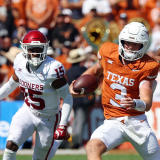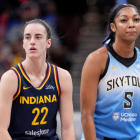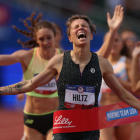More college football: Dennis Dodd | Jeremy Fowler | Jon Solomon | Latest news
Lawyers for the NCAA and the family of a deceased Frostburg State football player are fighting over whether NCAA president Mark Emmert should testify in the wrongful death lawsuit.
The NCAA is one of several defendants in the lawsuit brought by the family of Derek Sheely, who died in 2011 after suffering a brain injury during preseason football practice. The lawsuit, filed last August in Maryland state court, claims Frostburg State coaches kept berating Sheely to continue practicing even though he was bleeding profusely from his forehead after multiple hits to the head over several days of practices.
Sheely's family wanted the NCAA to investigate their son's death. The NCAA requires schools to provide concussion management plans, but doesn't enforce them. The NCAA has argued in the case that it has no legal duty to protect players since organizers of sporting events are not liable for injuries to voluntary participants when the risk of injury is obvious and foreseeable.
In recent weeks, lawyers for Sheely filed a motion to compel Emmert to give a deposition. The NCAA contends Emmert is an "inappropriate witness" at this stage of the case. The NCAA filed a motion for summary judgment that the Sheely family is opposing.
The plaintiffs want Emmert's testimony in part to discuss whether "the NCAA was capable of acting to protect against repetitive head trauma and second-impact syndrome, whether the NCAA formed an intention about how it would act, and how the NCAA went about carrying out its actions." The NCAA said the desire to depose Emmert is "misplaced" because he doesn't have the authority to impose rules on NCAA members.
The plaintiffs claimed Emmert discussed a 2011 letter sent by Sheely's mother to him with the NCAA's health and safety committee and directed a response sent on his behalf. The letter questioned why the NCAA didn't investigate Sheely's death. Four months later, NCAA health and safety director David Klossner sent a response to the family that extended condolences, noted that each school is responsible for the welfare of its athletes, and suggested Sheely's mother visit the NCAA's health and safety web page.
The plaintiffs said they're entitled to ask Emmert what personal knowledge he has of Sheely's death and the letter sent to him. Also named in the lawsuit were two Frostburg State coaches, an assistant athletic trainer and helmet manufacturer Schutt Sports.
The NCAA said the plaintiffs "simply assume" Emmert discussed with the health and safety committee the letter from Sheely's mother. According to the NCAA, the plaintiffs can't show that Emmert has unique knowledge relevant to the case and wasn't at the Frostburg State practice when Sheely died.
The NCAA wrote that it's willing to provide the plaintiffs with witnesses to answer questions about any topics they believe are relevant. The NCAA said it has produced to the plaintiffs 28,716 documents and eight transcripts of testimony from relevant NCAA employees.
At a Senate committee hearing last week, the first question asked of Emmert was about the NCAA's position in the Sheely lawsuit that it has no legal duty to protect college athletes.
"I will not quibble about the language," Emmert said. "I think that was at the very least a terrible choice of words created by legal counsel to make a legal argument. I'm not a lawyer. I'm not going to defend or deny what a lawyer wrote in a lawsuit. I will unequivocally state we have a clear moral obligation to make sure we do everything we can to protect and support student-athletes."
Sen. Jay Rockefeller (D-W.Va.) responded that he perceives there to be a "web of convenient protection to all parties" in college sports and suggested Congress needs to subpoena university presidents from public universities. The NCAA recently announced new "inter-association" concussion guidelines, drawing some praise and also some skepticism since the guidelines aren't rules.















